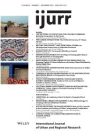Urban policy agendas are increasingly focused on the mobilization of active citizens and the propagation of cosmopolitan identities. This reflects a growing convergence between countries in urban policy thinking and practice, and greater uniformity in the terms and concepts that are used in different countries. This article draws on empirical evidence from Taipei, Taiwan to explore the form and character of changing urban policy agendas and their impacts on urban environments and communities. Taipei has undergone radical social, economic and political change in recent decades, and in the 2000s policymakers readily adopted the discourses of cosmopolitanism and community empowerment to legitimate major redevelopment projects. We develop the argument that this turn to cosmopolitanism lies at the heart of a paradox. On the one hand it is presented by policymakers as a radical, emancipatory programme that reflects wider shifts in the aspirations and expectations of increasingly active and globally oriented citizens. On the other hand, the term is used to underpin reactionary or conservative agendas that seek to sustain and extend existing power relations. The article argues that greater academic and policy attention needs to be given to the socially situated nature of cosmopolitanism and its characterizations in diverse contexts.
Details
Written by:
MIKE RACO, ROB IMRIE, WEN‐I LIN
Digital Object Identifier (DOI)
10.1111/j.1468-2427.2010.00941.x
About DOI
Read full article as PDF
Read full article as HTML
See the references for this article
